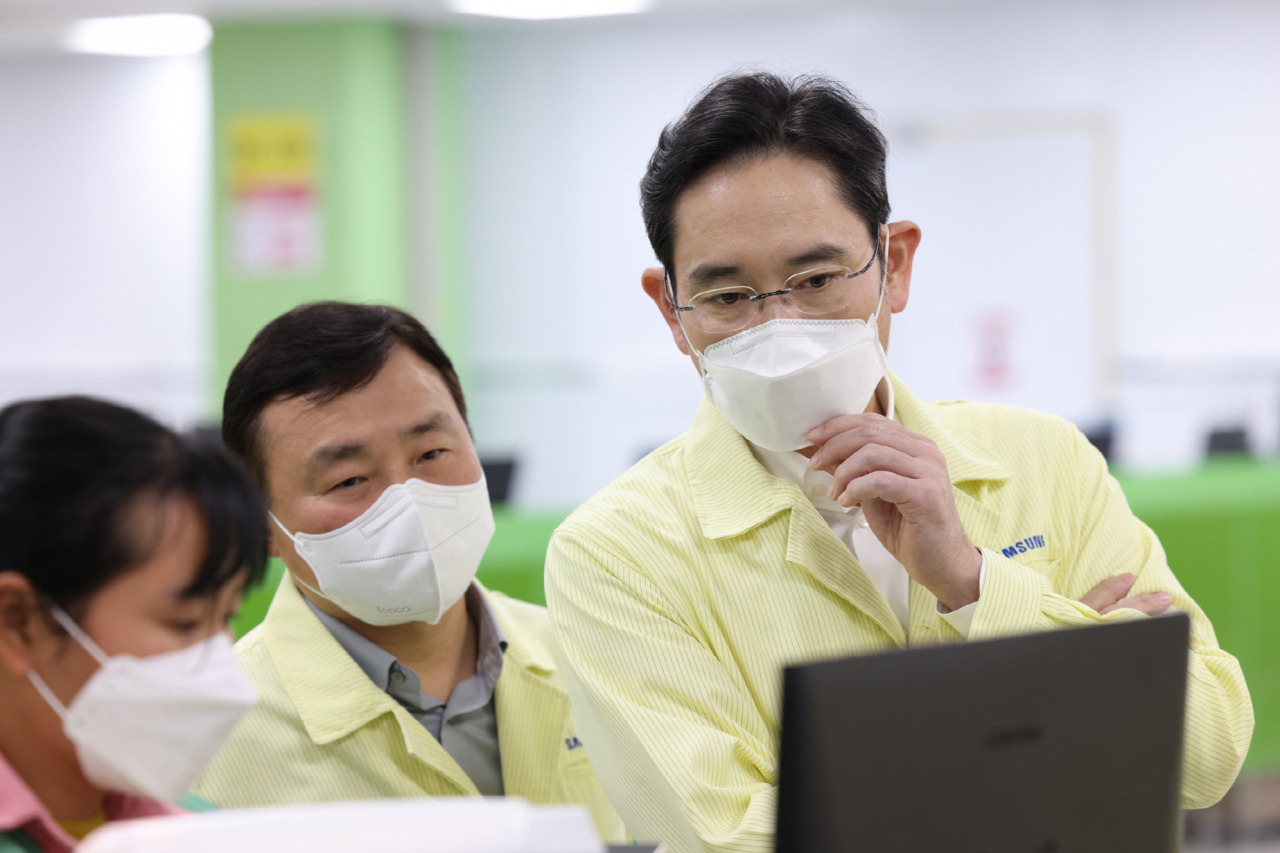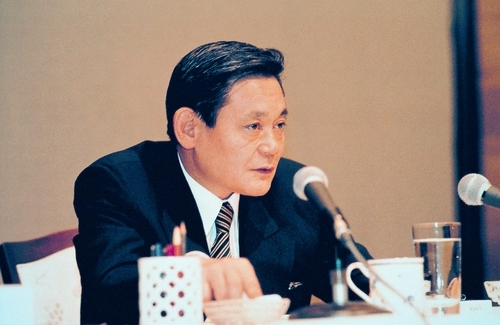 |
Samsung Electronics Chairman Lee Jae-yong (right) inspects the company's display-making unit Samsung Display's smartphone manufacturing plant near Hanoi, Vietnam in last December. (Samsung Electronics) |
Samsung Electronics, the world’s leading smartphone and chip maker, on Wednesday marks the 30th anniversary of the late former chairman’s iconic New Management Initiative, which is widely considered to have led the then consumer appliance firm towards becoming a global tech powerhouse.
Three decades ago, Samsung late former Chairman Lee Kun-hee convened an executive meeting in Frankfurt, Germany for three days, during which he urged a drastic change in management.
"If you are to change, change completely. I'm not kidding. Change everything except your wife and children," Lee said, speaking to some 200 company executives.
The declaration, also referred to as the “Frankfurt Declaration,” is considered one of the milestone moments of Samsung Group, the nation’s largest conglomerate, when a strategic shift was made in its quantity-centered management to focus on quality, paving the way for Samsung’s triumphant growth in the next decades.
Following Lee's determined call, Samsung introduced a new corporate identity, and changed its logo to carry its English name. A year later, Samsung came to develop the world’s first 256-megabyte DRAM semiconductor, and then a 1-gigabyte DRAM in 1996.
Since the iconic declaration 30 years ago, Samsung has undergone exponential growth. The combined market cap of the Samsung Group affiliates has grown 200-fold to reach 626.6 trillion won ($481 billion) as of Friday, from 3.1 trillion won in 1993. Revenue has reached 466.8 trillion won from 41 trillion won three decades ago, and operating profit has risen to 55.6 trillion won from 490 billion won.
 |
Late former Samsung Electronics Chairman Lee Kun-hee delivers New Management Initiative speech in Frankfurt, Germany on June 7, 1993. (Samsung Electronics) |
Lee Jae-yong’s ‘New Samsung’ taking shape
According to company officials, Samsung Electronics and its affiliates have no plan to hold a commemorative event for the 30th anniversary of the declaration this year. In recent years, Samsung has celebrated key events in a low-key way, possibly to avoid public scrutiny as well as due to the COVID-19 pandemic.
In the wake of the economic downturn and growing geopolitical uncertainties amid the escalating US-China rivalry, eyes are on how Chairman Lee Jae-yong, the only son of the charismatic former chairman, will ride the tide of the downturn and realize his own management vision.
In January 2021, Lee, then vice chairman, unveiled his “New Samsung” vision, under which the tech giant pursues the “Super Gap” strategy to become the unrivaled No. 1 in key areas such as chips and biotech while adopting a more flexible corporate culture overall.
The vision started taking shape in November last year, when Lee officially took office as chairman of Samsung Electronics, the group’s crown jewel, two years after his father’s death in 2020 and 31 years after he joined the company back in 1991.
Since then, he has been keeping busy bolstering the global network and inspecting operations at home and abroad.
Visiting the US to accompany President Yoo Suk Yeol on his state visit in May, Lee extended his stay to meet with Nvidia CEO Jensen Huang, Tesla CEO Elon Musk, Apple CEO Tim Cook and Google CEO Sundar Pichai, among others.
The Samsung chief still has his hands full with hot-button issues -- from the sluggish chip business to supply chain disruptions to geopolitical risks.
Hit hard by falling chip prices, Samsung witnessed its operating profit plunge 95.5 percent to record 640.2 billion won. The semiconductor division, its key business sector, logged an operating loss of 4.58 trillion won in the same period.
Under Lee's leadership, Samsung has announced to pour 300 trillion won until 2042 into building a massive semiconductor cluster in Yongin, Gyeonggi Province, in a bid to gain an unrivaled competitive edge in chips and reduce external risks.
The world's No. 1 memory chip maker also eyes expanding its presence in the logic chip market, with its existing foundry business.
The Samsung chief has vowed to boost the conglomerate's burgeoning biopharmaceutical business to "repeat the success story of semiconductors," and is also looking to strengthen its technological prowess in the artificial intelligence, robot and virtual and augmented reality sectors.
In the meantime, Samsung plans to hold a global strategic meeting later this month, with all the top executives and overseas business chiefs from around the world gathering both in-person and virtually. Lee is unlikely to attend the meeting and will be briefed later as in previous years.







